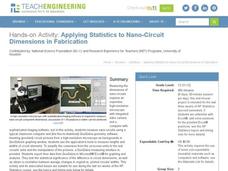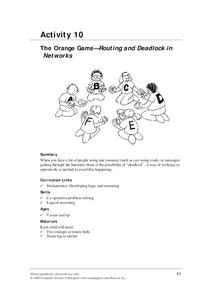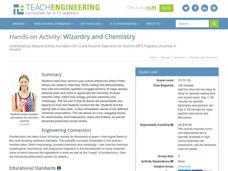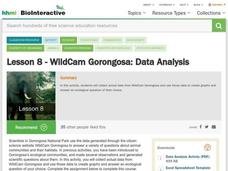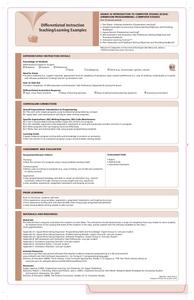Northeast Foundation for Children, Inc.
Classroom Setup: Kindergarten
Whether you're planning to set up your classroom for the start of another school year or just need a change of scenery, this sample chapter taken from a Responsive Classroom book provides suggestions for making the most...
Kenan Fellows
Terrarium in a Bottle: Modeling the Atmosphere, Greenhouse Effect, and Water Cycle
You've heard of farm to table ... but what about farm in classroom? Junior agriculturalists embark upon a two-week journey into the science of growing things. Based upon the classic terrarium in a two-liter experiment, the lesson goes...
Teach Engineering
Applying Statistics to Nano-Circuit Dimensions in Fabrication
Do flexible circuits change dimensions during fabrication? Groups use GeoGebra software to measure the length of pictures of flexible nano-circuits. To determine if the circuits change dimensions, future engineers use Microsoft...
Dr. Seuss Enterprises
Dr. Seuss in the Classroom
Explore the works of Dr. Seuss, such as Horton Hears a Who, Horton Hatches and Egg, The Sneetches and Other Stories, The Lorax, The Butter Battle Book, and Yertle the Turtle and Other Stories. Each story lesson includes reading...
Teach Engineering
Lighting in My Classroom Survey
How much energy does it take to light a room? Class members calculate the total wattage it takes to light the classroom. Through calculations, responsible scientists determine the cost of energy for the year, then figure out...
Virginia English Bulletin
Book Trailer Projects From Classroom to Community
Invite your pupils to express their understanding of a novel through a collaborative video project. Groups choose a novel from those you have studied in class, select four scenes, storyboard the scenes, film the scenes, edit the film,...
Computer Science Unplugged
The Orange Game–Routing and Deadlock in Networks
How is data able to move in a congested network? Groups simulate moving data around a congested network by passing fruit around a circle, following specific rules, until everyone ends up with their own fruit. Extension activities...
Discovery Education
Jets in Flight
This Discovery Education activity provides the information needed to understand the basics of flight. Before taking off, young pilots learn the eight stages of the engineering design process. Small groups then design and build...
Google
Interland
"Be Internet Awesome" is the motto in a super cool digital citizenship interactive created by Google. Interland is made up of four lands that explore the importance of digital safety and helps young Internet users to be alert, strong,...
NASA
NASA: Moving Cargo
How does NASA transport people and cargo to planets? The five-lesson unit breaks down the transportation system that scientists use to transport cargo to space. Pairs team up in order to devise a transportation system that will...
Computer Science Unplugged
Battleships—Searching Algorithms
How does a computer perform a search in order to find data? The lesson begins with a demonstration on finding one number out of 15. Pairs then play three games of Battleship by using different search techniques. The lesson...
Computer Science Unplugged
Beat the Clock—Sorting Networks
Can multiple computers sort a list faster than one? Using a network drawn with chalk outside, groups move through the decision network to sort numbers. A series of extension questions come with the lesson and can be used in the same...
NASA
Hurricanes and Hot Towers with TRMM
Take cover because a wild presentation on hurricanes is about to make landfall in your classroom! An outstanding PowerPoint presentation is the centerpiece of this instructional activity. Not only does it provide information and...
Teach Engineering
Wizardry and Chemistry
No need to go to Ollivanders to buy a magic wand. In the chemistry lab activity, young magicians mix chemicals to create combustible compounds. By applying these compounds to an iron wire, they create magic wands.
Little Bit Studio
Bugs and Buttons 2
Playing with bugs and buttons has never been so much fun! Offering a variety of different activities, this is a great resource for developing basic skills in preschool and kindergarten-aged children.
Cornell University
Fibers, Dyes, and the Environment
Nanofibers can be made through electrospinning or force spinning in order to reduce the negative impact on the environment. Pupils study the role of fibers and dye on the environment through a series of five hands-on activities. Then,...
Nemours KidsHealth
Screen Time: Grades 3-5
Encourage pupils to spend less time in front of a screen with two lessons that challenge them to examine their habits and try to make new ones. In lesson one, the class brainstorms activities to partake in instead of spending time in...
International Technology Education Association
Pixel This!
Did the image I drew match the image you saw? By simulating a satellite and a ground station, teams of two transmit data in the form of pixels in order to recreate an image. They use four different levels of brightness, creating slightly...
International Technology Education Association
Tidy Up Those Sloppy Force Fields!
It is just magnetic. This resource presents the concept of Earth's and another planet's magnetic field and how spacecrafts detect them. Learners study a problem using magnetometers and participate in three experiments to come up with a...
Howard Hughes Medical Institute
Lesson 8: WildCam Gorongosa Data Analysis
How do scientists analyze data to get a specific answer to a question? The final chapter in an eight-part series of activities centered around Gorongosa National Park encourages scholars to dig deeper into the scientific process. After...
Google
Be Internet Awesome
Teach the qualities of a digitally smart citizen with a set of lesson plans created by Google. Along with creating strong passwords, learners explore how to protect their privacy, when to stand up for others against cyberbullying,...
Rochester Institue of Technology
Ergonomic Design
To an engineer, the glass is never half full; it's just double the necessary size. The fifth installment of a nine-part technology and engineering series teaches pupils about the idea of ergonomic design. Measurements of popliteal height...
Mascil Project
Design and Build Your Own Vacuum Cleaner, Hair Dryer or Toy Car
No vacuum cleaner? No problem, just build your own. Scholars apply knowledge of currents to build a model of either a vacuum clear, a hair dryer, or a toy car. While the class completes the activity, instructors consider gender...
Ontario
Animation Programming—Computer Studies
Introduce high schoolers interested in animation programming to fundamental programming concepts so that they can plan and write simple programs.


